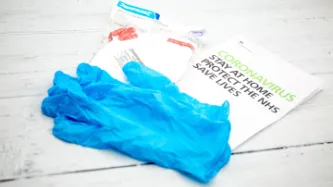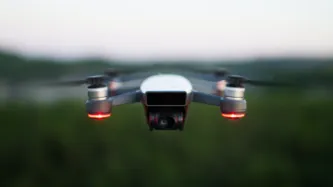Advanced Search
Content Type: Examples
As part of their preparations to ease the lockdown, French authorities have added AI tools into the CCTV cameras in the Paris Metro to detect the number of passengers who are wearing face masks. The system is also being used in outdoor markets and buses in Cannes. Although it is mandatory to wear a mask on public transport in France, the software won't be used to identify, rebuke, or fine people, and the system has not proved as contentious as contact tracing. The data protection regulator CNIL…
Content Type: Examples
Taking advantage of the pandemic to close US borders, the Trump administration is also spreading coronavirus infection by deporting detainees to receiving countries such as Guatemala, where 20% of infections are deportees. Guatemala has only two hospitals and a scattering of smaller regional medical facilities to serve its population of 18 million people. As of April 2020, 5,000 Guatemalans were being held in detention in the US, and every week the Department of Homeland Security was sending…
Content Type: Examples
Cameras repurposed as "fever-detecting" aren't designed for and are not very good at detecting infections, but businesses, airlines, major employers, and public officials are nonetheless reacting to the coronavirus pandemic by spending large sums to buy them without understanding their limitations. The systems can detect elevated skin temperatures, but aren't precise enough to be able to identify the cause. In addition, many people who develop COVID-19 don't have fevers. The scanners have not…
Content Type: Examples
At a press conference, Israeli prime minister Benjamin Netanyahu suggested that microchipping everyone, beginning with children returning to school and kindergarten as the coronavirus lockdown ends; the chip would sound an alarm whenever anyone gets too close much as a car does. Security experts immediately objected on the grounds that microchipping kids was neither legal nor practical, that the children would be at risk from paedophiles if their data leaked to the internet; and that the real…
Content Type: Examples
Any user of India's Aaorgya Setu contact tracing app can now request deletion of the data they've entered according to the Aaorgya Seta Emergency Data Access and Knowledge Sharing Protocol, 2020, which specifies the definition, collection, processing, and storage of the data the app collects. The protocol will be applicable for the next six months, and also increases the amount of time the data will be retained from 60 days to 180. IT ministry officials said the protocol was needed after a…
Content Type: Examples
Many of the technologies used to combat the coronavirus pandemic, including monitoring and analysing social media posts, telecommunications location data, and the use of sensors, were first tested on refugees during the 2015 crisis and are now being repurposed in the name of public health. In 2019, the European border security agency Frontex published a €400,000 tender for social media analysis services hoping to better predict future migration patterns; the tender was withdrawn after an…
Content Type: Examples
Among the regulations governing restaurants as the US State of Maine's moves into a phased reopening is a requirement to maintain customer records for contact tracing purposes, including one customer's name and contact information per party and those of the table's server. The regulations also recommend promoting contactless payment options.
Writer: State of Maine
Publication: State of Maine
Content Type: Examples
In designing its Healthy Together contact tracing app, the US state of Utah opted for a GPS and Bluetooth-based design created by social media startup Twenty; it does not use the Google-Apple API. The goal is for the app to assist the 1,200 Utah Department of Health workers who are doing phone call-based contact tracing. Twenty believes the app's ability to store location and contact history over 14 days can cut the length of phone calls from one hour to 16 minutes. The Apple-Google platform…
Content Type: Examples
In its final report, the expert group appointed by the Norwegian Ministry of Health and Care Services to assess the security and privacy of the country's COVID-19 contact tracing app, "Smittestopp", concluded that the app handles neither responsibly. The group recommended removing all data once it's not needed (15 to 16 days for location data, for example), implement differential privacy, open the source code wherever possible, and regularly reevaluate the app against its two purposes: contact…
Content Type: Examples
France, like the UK, opted to develop its own contact tracing app. "StopCovid", using a centralised design developed by the Pan-European Privacy-Preserving Proxity Tracing (PEPP-PT) group, which created a framework called ROBust and the privacy-presERving proximity Tracing protocol (ROBERT). French ministers have defended the decision to choose ROBERT rather than the decentralised options, DP3T or Apple's and Google's jointly developed API, saying that the app is not intended to monitor…
Content Type: Examples
As the waning pandemic leads to signs that the protest movement is resuming, China is moving to draft new national security legislation and incorporate it into Hong Kong's Basic Law, bypassing the territory's Legislative Council. Elections for the Council are due to be held in September, and Chinese officials are concerned that they could lose its pro-Beijing majority. Under Article 23 of the Basic Law, Hong Kong's government and legislature were required to enact and pass national security…
Content Type: Examples
INTERNETLAB offers an extensive analysis of all the eight different Covid-19 related apps being discussed in Brazil at the moment. Apps were rated according to four parameters: consent, need, transparency and security. Besides this, the organisation takes a look into what permissions which app has and analyses these permissions in light of what the apps promise to deliver.
Writer: Alessandra Gomes, Maria Luciano, Nathalie Fragoso e Victor Pavarin
Publication: INTERNETLAB
…
Content Type: Examples
Following a similar effort in the Netherlands, the UK is planning a national research programme in collaboration with universities, water companies, and public research bodies to detect coronavirus in sewage for use as an early warning system for future outbreaks of COVID-19. About half of those infected with SARS-CoV-2 excrete it in feces, and enough survives when sewage reaches treatment plants to test successfully for its genetic fingerprint using PCR analysis. The Dutch programme is run by…
Content Type: Examples
Immunity passports are likely to increase discrimination and threaten fairness and public health - and won't work for practical reasons. First and foremost, scientists do not yet know whether infection confers immunity or for how long; the serological tests so far developed are insufficiently reliable; the volume of testing required is not feasible; and no country has enough survivors of COVID-19 to boost its economy. There are also numerous ethical objections.
Writer: Natalie Kofler and…
Content Type: Examples
It's been two months since the launch of "Perú en us manos", the mobile app promoted by the Peruvian government amidst the Covid-19 pandemic. Until now the app did not accomplish the ambitious goals it set out to.
On its first month the app had detected 1400 risk zones while there where already 36,000 confirmed infection cases. There is little transparency on how those risk zones are estimated. Developers of the app state that only one fifth of the data provided by the Health Ministry is clean…
Content Type: Examples
Numerous companies are repurposing their body monitors, asset trackers, and electronic ankle monitors and marketing them to the newly-created market for strap-on surveillance bracelets to enforce quarantine and social distancing including companies such as AiRISTA Flow. Redpoint Positioning Corporation, Israel-based SuperCom.
https://theintercept.com/2020/05/25/coronavirus-tracking-bracelets-monitors-surveillance-supercom/
Writer: Sam Biddle
Publication: The Intercept
Content Type: Examples
An Ipsos MORI survey conducted on May 20-22 found generally high levels of compliance with lockdown restrictions, though many were suffering. While roughly three-quarters were confident they could download and operate a contact tracing app and would be willing to comply with its recommendations, only 40% were confident or fairly confident that they could trust the government to protect their and other people's data, and only 42% were confident or fairly confident that the app could help limit…
Content Type: News & Analysis
As countries around the world develop contact tracing apps to contain the spread of Coronavirus, they keep facing a problem: for them to be effective a certain percentage of the population has to download them. Something like 60% is the threshold for the app to be effective. So far only Iceland has gotten close with 38% of their country downloading it.
The UK is currently trialling an app, which is designed to notify people if they've been close to someone with symptoms of covid-19 for 15…
Content Type: News & Analysis
This week, we read that a former Apple contractor who blew the whistle on the company’s programme to listen to users’ Siri recordings has decided to go public, in protest at the lack of action taken as a result of the July 2019 disclosures. The news adds to a series of revelations that have been reported over the past months.
While the issue raises serious questions regarding the compatibility of such practices with data protection laws, at the same time, it highlights a wider problem that…
Content Type: Examples
As the first confirmed coronavirus case in Pakistan, Yahyah Jaffery became a pariah after his identity, photograph, and home address were leaked on social media. Similar leaks about dozens of other patients and medical staff followed. The contact tracing system being used for coronavirus was originally developed by the country's Inter-Service Intelligence (ISI) to combat terrorism; it is based on a new data hub in Islamabad that will collect information from the ISI tracking system and share…
Content Type: Examples
A remote-controlled yellow and black robot dog built by Boston Dynamics has been deployed in a Singapore central park for a two-week trial in which the dog politely, in a female voice, in English, reminds cyclists and joggers to stay at least one metre apart. Breaking the lockdown rules attracts fines and even jail time. Residents are only allowed to leave home alone for essential trips and must wear a mask at all times in public.
Other robots being trialled include a small car. The robot dog…
Content Type: Examples
Under the country's emergency laws, on May 4 the Hungarian government announced it would suspend parts of GDPR and exempted authorities from key provisions such as subject access rights, the right to request erasures, and providing notice that personal information is being collected and stored as long as the data is being collected under the rubric of coronavirus-related health protection.
The changes will remain in place until the government declares the end of the emergency. Opposition…
Content Type: Examples
Only 16% of Australians had downloaded the country's COVIDSafe app by May 3, a week after its launch on April 26, even though most said they support the federal government's coronavirus contact tracing app. In an Ipsos poll, 80% of those who said they were unlikely to download the app cited privacy concerns such as who holds and has access to the data, and which country's law applies. The government has said its goal is for at least half of the population to download and install the app.…
Content Type: Examples
The Australian journalist Chris Buckley, who reports for the New York Times, was forced to leave China on April 10 after 24 years of reporting on the country, bringing the number of journalists forced out of the country in the last year to 19.
After travelling to Wuhan to report on the unfolding outbreak on the day the city was locked down in January, he was told to stop when his press card expired in February. The division of the Foreign Ministry responsible for international media…
Content Type: Examples
The Egyptian president, Abdel-Fattah el-Sissi, has approved 18 amendments to the country's emergency law that allow him and security agencies additional powers. Only five of the amendments are clearly related to public health.
Along with closing schools and universities, quarantining people returning to the country, postpone taxes and utility payments, and provide economic support, additions include expanded powers to ban public and private meetings, protects, celebrations, and other forms of…
Content Type: Examples
A parliamentary panel granted Israel's Shin Bet security service an additional three weeks to use mobile phone data to track people infected with the coronavirus; prime minister Benjamin Netanyahu had requested a six-week extension while his government drafts legislation to regulate the data use in line with requirements imposed by the Israeli Supreme Court. Testimony given to the parliament's intelligence subcommittee showed that the Shin Bet surveillance was the reason it was possible to…
Content Type: Examples
After a call from a vendor, India's state-owned Broadcast Engineering Consultants Limited (BECIL) put out an expression of interest for electronic bracelets and accompanying software for use to ensure that COVID-19 patients do not violate their quarantine orders.
A hundred companies responded. BECIL saw the idea as an opportunity to sell a patient surveillance system to municipal corporations, private companies, welfare resident societies, and central government departments. BECIL, which was…
Content Type: News & Analysis
In a legal challenge brought by French activist group, La Quadrature du Net (LGDN), the Conseil d’État, the French highest court, has ruled that the use of drones by the police in the context of monitoring compliance with Covid-19 lockdown measures was unlawful.
The ruling found that the imagery and footage captured by drones flying at a low altitude was personal data to the extent that individuals filmed were identifiable. Consequently, the operation of drones by the police amounted…


